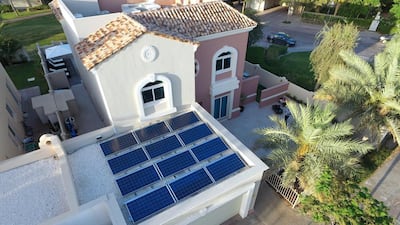The UAE is one of the hottest job markets in solar power, where engineers are likely to double their starting salary after earning an emirate-required certification for rooftop installations.
Solar engineers in the country can make anywhere from Dh10,000 a month in a small-scale or start-up company to more than Dh40,000 a month in a multinational company, according to one local industry expert, who declined to be named. For directors or vice presidents, that salary can reach between Dh70,000 and Dh150,000 a month – earnings comparable with more established markets in Europe.
Demand for a certain type of engineer – one in possession of the Dubai Electricity and Water Authority (Dewa) certification – is outstripping the supply. As Dubai gets going on the Shams Initiative, which in its first phase will put solar panels on roofs across the emirate, Dewa requires companies to register to take part in the installation process. This requirement includes, based on the size of a company, at least one engineer to have completed a basic certification course administered by the utility.
This is putting new company entrants at a disadvantage because the supply of engineers who meet regulatory requirements is small, said Johann Schoeman, a partner at the Dubai solar energy installer Oryx Solar, which has 18 employees and has hopes to expand to 50.
__________________
• HR firms falling short with UAE solar industry in growth spurt
__________________
The Dewa course is offered quarterly but companies such as Oryx did not want to wait for the next training session.
The company initially approached engineers who were already Dewa certified to expedite the process rather than wait for the next programme to begin several months later.
“We extended offers to two individuals who used that to negotiate with existing employers,” he said.
“So you’re talking about an electrical engineer with three to four years’ experience who went through Dewa training – which is a basic certification process. But as a company, you cannot complete the registration process with Dewa until you’ve employed this individual,” Mr Schoeman said.
When the company advertised the job vacancy, hundreds of CVs came flooding in. Yet over six months, only two people with the Dewa requirements had applied. The engineers used the offer from Oryx as leverage to get more money from their current employers because they were “irreplaceable”.
Oryx is trying to get a leg up in the race for residential and small commercial solar PV applications, building the contracting prowess of its parent company, TerraStruc, a multinational group with its headquarters in the UAE offering management, design, contracting and advisory services.
Mr Schoeman said that most of the Dewa-registered companies were civil contractors but Oryx has identified a need for building contractors focusing on small installations – and getting into the market early is a top priority.
“We matched what they asked for because we were desperate,” he said, adding that the first of two counter offers were about 20 per cent higher than the original offer.
The last counter offer was nearly double the original pay.
“Dewa certification gives one employee 40 per cent more than his neighbour, which is something I have a problem with,” he said. “These individuals are in high demand and there needs to be a policy change or something to encourage young engineers to pursue [this certification] locally.”
Last month, Dewa announced that 143 engineers had been certified as “enrolled electrical and solar PV consultants and contractors”. A Dewa spokesperson said sessions are held quarterly, designed to hold 40 to 50 people – which was the “typical number of nominees per quarter”.
“There’s some flexibility to accommodate a larger number and Dewa has done so every time nominations exceeded the target,” the spokesman said. “In other words, we have never put anyone on a waiting list asking them to attend the next quarter’s session since the first upcoming session was complete.”
Dewa’s managing director, Saeed Al Tayer, said the utility would look into the problem and amend if necessary.
lgraves@thenational.ae
Follow The National's Business section on Twitter

